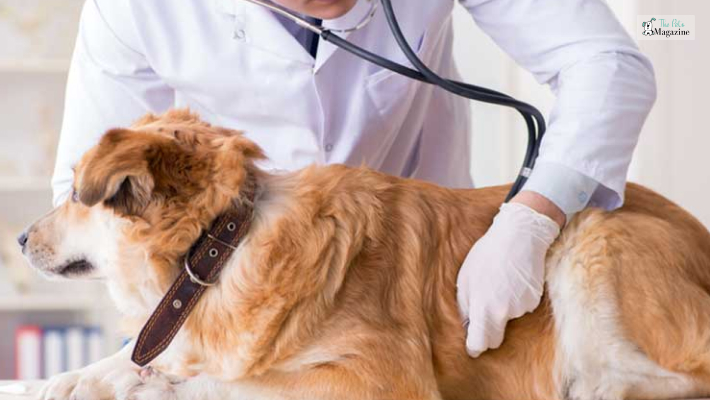Dog Stomach Gurgling: A Pet Parent’s Guide To Know The Sounds A Dog’s Stomach Make


Have you ever been worried about the gurgling sound our stomachs make often? No? We do not pay attention to that, as we know that this is not something alarming. But what about your dog? Do you know that your dog also faces the same thing? Yes, they do. Just like humans, dog stomach gurgling is also a thing.
You might not be sure what a gurgling stomach means for a dog, but do not worry. Today, we will walk through the essentials needed to know about dog stomach gurgling. Read the article to the end. We have covered all the pointers you need to know about that gurgling sound you hear from your dog’s stomach.
What dog stomach gurgling is? What does it sound like?
Mostly, dog stomach gurgling is not very loud. The gurgling sound is quite similar to what we humans feel. In technical medical terms, this gurgling sound is called borborygmi.

According to Dr. Kristopher Sharpe, a certified internist with BluePearl Speciality + Emergency Pet Hospital, “There can be both high- and low-pitched sounds, and if you feel the abdomen, you can sometimes feel intestinal contractions and movement associated with the sounds.”
Director of Operations at the Heart+Paw, Dr. Julie Sanders, says that dog stomach gurgling is a standard, physiological process. The sound is mainly caused by moving gas when it passes through the digestive tract.
She says, “As gas moves through the bowel through normal peristalsis (the term for normal front-to-back motion of the gut), that movement creates some gurgling noise, which is normal. It is always present to a small degree.”
Just as I mentioned in the beginning, the sound is relatively quiet, so it is not always possible for you to notice. But Dr. Sanders says, “What should not happen is very loud, very frequent stomach noise. In excess, this may be a sign of a problem or illness.” It is best to seek help if you cannot figure out the difference in sound when it is okay and when it is indicating a problem.
The possible reason behind dog stomach gurgling
The gastrointestinal tract is most of the time in motion. This includes the small intestine, large intestine, and stomach. These organs contain smooth muscles to help the water and food to move through their body.

Although the noise in their stomach does not always signify that the intestines and stomach are at work, moving everything through their digestive tract, various other factors can make this noise in dogs. Let’s explore the following:
Diarrhea
The sounds are more common when a dog is suffering from diarrhea. When the GI tract works fast and a lot of water passes through the intestines, the muscles in the tract start to contract rapidly. This causes your dog to poop liquid in large amounts, which creates a loud gurgling sound in their stomach.
But remember that diarrhea could be a sign of other medical conditions and can come with other symptoms like:
- Painful belly, distended and bloated
- Dehydration
- Passing of gas
- Foul breath
- Weight loss
- Vomiting
- Rectal bleeding
- Black or dark poop
- Less or decreased appetite
- Trying hard to poop but not passing
- A constant need to eat or drink
Your dog ate something that did not agree with them
You might want to experiment with their food, or they ate something on their own to test. Your dog could sneak up and try some unapproved snack, making their tummy rumble. Try changing their food from one to another if you notice this happening. This is a very common issue.
The amount of fiber and protein in every food is different. Something might suit them, and some things might not. This is where the bacteria in the GI tract start working. The more amount of food they receive, the more gas they start producing.
When they consume something they are not supposed to, it can make excessive gurgling sounds as their system tries to digest the new type of diet. It depends on how your dog handles the ingredients or how sensitive they are. It is on their sensitivity level what symptoms they will develop, like excessive gas, dehydration, diarrhea, and bloated belly.
See Also: The Ultimate Guide to Aspirin Dosage for Dogs: What You Need to Know
Excessive gas
Getting gas is not comfortable for anyone, be it human beings or any animals. If you hear a loud gurgling noise from your dog’s stomach, followed by a foul odor, that means there is a gas formed in their stomach. This can happen because of the following reasons:
- Aerophagia: Swallowed air a lot. This happens mostly in brachycephalic dogs or dogs with short faces, such as Bullgods or Boston Terriers.
- Digestion: While breaking down the food items, many tiny gas bubbles have also been released.
- Bacteria: The GI tract has bacteria that break down fibers and release gas in the process.
The noise that you are hearing from their stomach could be because these air bubbles are moving while the food is getting digested. It depends on what meal you are serving and on your dog’s capacity to digest.
If a dog is vomiting
This is not a very common scenario, but it does happen. When a dog is vomiting, their stomach might make that gurgling sound. This happens because when they are hurling, the water and food move quickly and in the wrong direction.
This happens when the dog forcefully brings out undigested food from their stomach through their mouth. You might notice their stomach heaving or your dog drooling with a shocking look on their face. But remember that vomiting for a long time may lead to dehydration, and if you notice that happening, contact your vet immediately.
If a dog is not eating
Anaroxia happens when a dog stops eating. When there is no water or food to cover the sounds of the muscles contracting, then you can hear the dog’s stomach gurgling. This is one of those times when you can listen to loud and clear sounds. Here, you have another reason behind those loud noises. If your pet refuses food and water for an extended period, it is best to call a vet.
Other problems that cause dog stomach gurgling
If you hear their stomach gurgle once in a while, then there is nothing to worry about. It is normal. But often, the noises from a stomach are symptoms of some other issues. So, if you find out that your dog is suffering from any of the conditions listed below, it is better to contact your vet to give them the required treatment.

Parvovirus
Parvovirus is quite common among unvaccinated dogs and puppies. It damages the intestinal lining and causes dog stomach gurgling and bloody diarrhea. Parvovirus comes with other symptoms like lethargy, fever, and appetite loss.
Bacteria and parasites
Pests and intestinal worms such as E. coli and Salmonella get into their intestines and block every nutrient that your dog needs. That is when the helpful bacteria is blocked a lot in the dog’s stomach, producing excessive gas when the dog digests their food. This is another reason you can hear loud noise from your dog’s stomach.
Colitis
This disease of the intestine happens when the colon is irritated or inflated. Colitis comes with various symptoms, including diarrhea, which is responsible for making the loud gurgling noise.
Colitis can happen because of various reasons like allergic reactions, bacterial infections, parasites, or because of some surgical trauma. This can be a one-time thing or get chronic.
Constipation
It might happen that even after trying a lot, your dog might not poop. However, constipation does not prevent the GI tract from making movements, so the gurgling sound continues as their muscles contract and they try to move other things. It becomes troublesome when your dog does not poop for a long time.
Hemorrhagic gastroenteritis (HGE)
Hemorrhagic gastroenteritis does not give a warning; it happens suddenly and comes with symptoms like bloody diarrhea and vomiting. This is commonly found in young dogs, toy breeds, and miniature breeds like Miniature Schnauzers and Yorkshire Terriers. But on the brighter side, there are several vet-recommended treatments that work for HGE.
Inflammatory bowel disease (IBD)
Well, to be completely honest, the reason behind inflammatory bowel movement is not clear, but the symptoms are the same. A dog who is suffering from inflammatory bowel disease will have their intestinal lining inflamed, which makes it difficult to digest a lot of food ingredients.
The inability to digest certain foods is the reason that creates the loud gurgling sound. If you notice this happening or going on for a while, it is better that you consult a vet and chalk out a special diet to figure out the combination of ingredients that will help in reducing the inflammation.
Bowel obstruction
When a dog is suffering from bowel obstruction or intestinal obstruction, a few parts of the intestines get partially or entirely blocked. This can happen by foreign objects like bones, toys, volvulus and dilation, tumors, or if they have excessive parasites in their intestines.
Their stomach tries to digest all these objects, and that is when you can hear the loud rumbling. You should not waste any time if you have seen your dog swallow something; just take them to the vet immediately.
How do you help your dog with stomach noises?
Just as I have mentioned earlier, it is not alarming if you hear a dog’s stomach gurgling once in a while, as that can happen when their stomach is trying to digest the food. But if the rumbling noise continues for a long time, with no possible explanation, then you should be worried. So, if you are thinking, “What can I give my dog for gurgling stomach,” then read the section below.

- It is best to feed your dog in small portions but frequently. The GI tract has the capacity to handle small surface volumes, so it becomes easy for the enzymes to break down the food if you offer small meals.
- Offer them sensitive stomach diets. This is the best thing you can do to treat their loud stomach rumbling. These diets are light and are easy for the intestine to break down.
- Drinking water is not only good for humans but also for your pets. Water will the food moving through the GI tract down the intestines and help with muscle contractions. This will help in reducing the loud rumblings and the frequency as well.
- If your dog has a tendency to gulp food, then there is a chance that they gulp a lot of air along with it, causing aerophagia. The extra air that goes into their stomach is responsible for creating dog stomach rumbling loudly. Using a slow-feeder bowl will help you ensure that they are taking their food slow, which will reduce their consumption of air.
- Take them for a walk or engage them in light exercises that will help stimulate their GI tract. Go for a gentle walk if you are going after dinner, but if your dog prefers to run, then take them out before dinner.
- Stress has its own way of interfering with the whole process of digestion. If your dog is getting anxious, it will take time to digest their food. Calm them down, and keep the process of digestion smooth.
See Also: Understanding the Benefits of Trazodone for Dogs: A Comprehensive Guide
When should you take them to a vet?

As I have mentioned over and over again, that dog stomach rumbling is not something serious, but when it is accompanied by some other physical conditions, then you should take them to a vet immediately. Some of those signs are:
- Loss of energy
- Decreased appetite
- If you hear dog stomach gurgling and diarrhea
- If you notice dog stomach gurgling and vomiting
- Hypersalivation
- Restlessness
Bottom Line
So, if you wake up from your sleep to the sound of a dog stomach gurgling at night, there is nothing to worry about. It is just their stomach trying to digest the food and pass it through the intestines.
So, just try to figure out if this is happening frequently before you start to panic. If not, just sit back and relax, and let their stomach do the necessary deed. But if you are still worried about your dog’s health, then it is best you take them to a doctor and seek guidance from a professional.
MORE FROM THE PETSMAGAZINE:









Leave A Comment